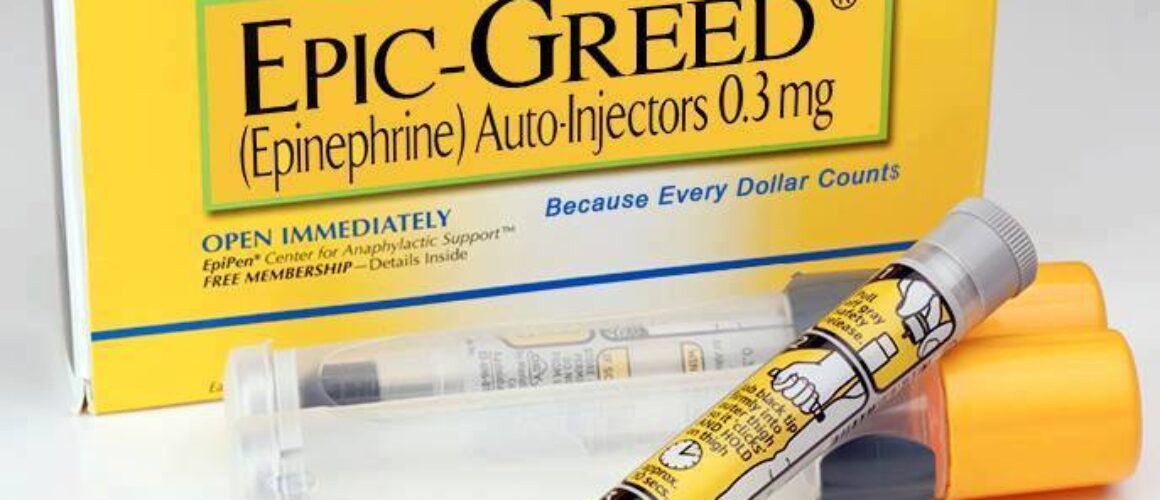Illegal Conduct: Mylan’s Chairman and His $100 Million Salary
Yesterday, I was contacted by someone in the press to get my reaction to the fact that Mylan’s chairman, Robert Coury, was paid almost $100 million in 2016 and received an additional $60 million in retirement benefits.
The journalist wanted my reaction, given that the company jacked up the price of EpiPen, their signature product, 17 times over the last several years, an increase of over 600%. These price hikes put children’s lives at risk as parents could no longer afford the device.
What did I think about the chairman of this board? I immediately thought of the aftermath of the Well Fargo scandal that spurred investors to build a stronger board.
Mylan’s investors need to build a stronger board.
There are so many inherent conflicts of interests here that it is hard to know where to start.
Analysts attending to the pharmaceutical industry events have spoken to the relationship between Coury and his CEO Bresch, as has other pharma CEOs. Interestingly, Coury was nowhere to be seen last year during #epigate. He sent CEO Bresch out on the frontline to deal with the #epigate furor as it hit, and the stock tanked almost 30%.
Coury oversaw Bresch’s ascension to the top ranks of the company without completing her MBA, leading to one of the first scandals the company faced, before working together to build the monopoly that became Mylan.
As chairman, Coury also oversaw Mylan’s Compensation Committee and what are known as “bid grids,” negotiations with the pharmacy benefit managers that allowed Mylan to keep their competition off of the shelves of pharmacies.
Bid grids directly impacted not only Mylan’s revenue but also their market share. In these negotiations, a company would agree to kick back a certain dollar amount to the pharmacy benefit managers in exchange for locking out their competition. They are now being sued by Sanofi for this anti-competitive behavior and “engaging in illegal conduct.”
Coury also oversaw the ever greening of the EpiPen patent, recently brought to light in a recent class action lawsuit filed against the company.
He also engineered the tax inversion, relocating Mylan’s headquarters overseas in order to avoid paying substantial taxes in the U.S. This was orchestrated as EpiPen’s market share exploded to a 94% monopoly and the price of the device was jacked up 17 times.
Coury also, as board chair, oversaw the fact that American parents were paying over $600 for a device that cost Canadian moms and dads about $100. He put lives at risk, and it is hard to put a number to those costs.
As the #epigate story broke last year, we heard from pharmacists who spoke about crying mothers at their counters, no longer able to afford EpiPens. We heard from mothers who split their packages in two, putting a child who may need two injections at risk. And we heard from families who chose between buying an EpiPen and paying their rent or mortgage or food bills. But without a doubt, the hardest conversations we had were with the parents who lost their children to a life-threatening allergic reaction.
Since then, Cigna announced that they will no longer cover Mylan’s top revenue generator and CVS Pharmacy launched an alternative at 1/6 the price. On top of that, Auvi-Q returned to market in February, and a another auto injector company just filed an IPO to raise the funds to bring their product to market.
When I read about Coury’s pay package, it reminded me of 20 points made last year, as #epigate hit: 20 things you may not know about Mylan, the company that makes EpiPen. These 20 points are why, before pointing the finger at anyone else, the company has a lot to take care of internally. Something that the resigning Coury will neatly side-step.
20 Things You May Not Know About the EpiPen Company
- The price of the EpiPen has increased 17 times since Mylan acquired the company in 2007.
- Mylan left United States for a tax inversion. It moved its headquarters to the Netherlands to avoid paying higher taxes and to avoid a takeover.
- The Dutch maneuver and movement of the company’s headquarters overseas, which transferred a large chunk of Mylan shares to a special foundation called a stichting, also acted as a poison pill that would undermine takeovers.
- Senator Joe Manchin (of West Virginia) has a daughter who is the CEO of Mylan.
- Mylan was originally a West Virginia company where the Senator is from.
- Even Senator Joe Manchin said the tax inversion should be illegal.
- EpiPens were about $57 when Mylan acquired it. Today, it can empty pockets of $600 or more in the US
- EpiPens were invented in 1977, almost 40 years ago. A patent life is usually 17 years.
- Mylan’s profits from selling EpiPens, which they have aggressively, famously marketed, hit $1.2 billion in 2015.
- That year, Bloomberg reported that the epinephrine-delivery system represented 40% of Mylan’s operating profits.
- EpiPen was developed for the U.S. military for treating exposure to nerve agents in the course of chemical warfare
- The top five executives of Mylan pull in over $85 million dollars. The CEO makes about $19 million.
- The CEO claimed to have an MBA from West Virginia University despite being 22 credits short of completion.
- EpiPen Canada has not raised its prices in any significant way.
- In France, two EpiPens cost about $85. Two EpiPens in the U.K. cost 89.99 pounds.
- EpiPens in Australia cost about $40 AUD.
- EpiPens in the U.S. cost more than anywhere else in the world.
- The price of EpiPens in the U.S. is up almost 600%. The CEO’s salary is up 800%.
- According to Wells Fargo, Mylan raised prices by more than 20% on 24 products, and by more than 100% on seven products. The analyst who wrote the report warned that Mylan could draw “greater regulatory scrutiny and headline risk” as a result of such price boosts.
- The CEO, Heather Bresch, interviewed today for “taking it on the chin,” spoke about her over 90% market share and monopoly before Congress. She is one of the top paid executives in the pharmaceutical industry.
The bottom line is that lives are at risk. Kids are “taking it on the chin,” parents are “taking it on the chin.”
Will Coury sail off into retirement now with his $160+ million pay package and continue to throw Bresch to the wolves?
How does that impact the 1 in 13 kids with food allergies? Some families need as many as 8 sets of EpiPens if they have multiple children with food allergies. They can no longer afford to keep their children safe. It’s hitting parents and taxpayers.
I have heard from a mother who said two EpiPens didn’t save her child. I’ve also heard from Congressmen and countless others whose lives have been directly impacted by Mylan’s price-gouging.
You have to wonder, in the company’s cost-benefit analysis, what is the value Mylan placed on a child’s life? What price elasticity did they discover when Ms. Bresch and her team decided to jack up the price of EpiPens seventeen times? What process did Coury oversee in deciding to jack up the price of seven other drugs in their portfolio over 100% last year?
Maybe perhaps before Coury retires, we will get to see that deck and presentation.
CEO Heather Bresch’s salary was docked in 2016 from $18 million down to $13 million. Maybe Nora O’Donnel was right in that interview earlier this year, and it really is Ms. Bresch who “took it on the chin.” It certainly wasn’t Coury.
It’s hard to stomach this kind of arrogance and greed. And rightfully, families around the country had an allergic reaction when they saw Coury’s pay package. Three board members are resigning this year, one is real estate developer being investigated by the SEC for land deals he did with Mylan.
Too many lives have been lost, too many more are still at risk if this company is allowed to continue to operate without further investigation.
If we’ve seen anything, Mylan’s EpiPen does nothing to quell the inflammation that is greed. And just as federal funding of food allergy research could use a shot in the arm, so could another federal investigation of this company.
Written in memory of Sabrina, Emily, Oakley, Joseph, Gio and the countless other children whose lives have been lost to a life-threatning food allergic reaction.
More information can be found here on their proposed “price cut” and other concerns from families, those in the Senate and business analysts:
http://video.cnbc.com/gallery/?video=3000545619












